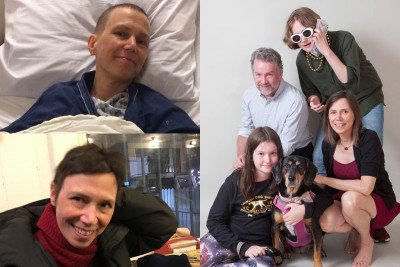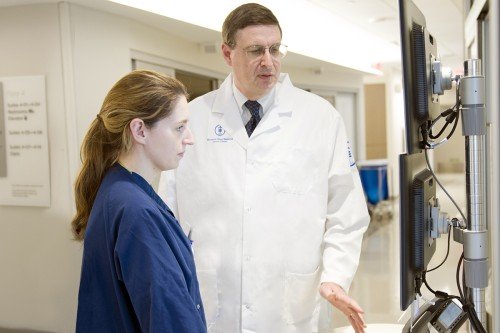'You’re Going to Get Through This.' An MSK Patient Reflects on Her Treatment for Pancreatic Cancer
From the beginning, Margo's case was unusual. That called for an equally "outside-the-box" approach to treatment. Her team of doctors and nurses at MSK were there for her every step of the way.

Margo Gibson’s doctors advised her not to Google her diagnosis. They knew the statistics of pancreatic cancer would depress her. But they also knew that every cancer is unique, and statistics don’t tell the whole story.
“You’re going to get through this,” she recalls them telling her repeatedly throughout treatment.
The doctors weren’t being blindly optimistic — they had reasons to believe that Margo might beat the odds.
An office manager and married mother of two living in Brooklyn, Margo learned of her cancer in May 2018. She had been feeling a bit bloated and her jeans weren’t quite fitting. “Then I felt a weird button sort of pop out above my navel,” she says. Margo went to her doctor who performed an ultrasound. That test revealed a three-centimeter tumor in her pancreas and a mysterious 14-centimeter mass engulfing her ovary. That’s when she came to MSK.
Margo’s doctors, including medical oncologist Danny Khalil and surgeon Vance Broach, recommended she go on intensive chemotherapy right away. They wanted to shrink the tumor in her pancreas as much as possible before surgically removing it along with the ovarian mass.
What happened next proved that Margo’s case was unusual and gave her hope that she might, indeed, get through this.
An Exceptional Responder
Pancreatic cancer is typically a fast-growing, aggressive tumor. Even after surgery to remove it, pancreatic cancer has a habit of coming back, either in the pancreas or elsewhere in the body. It’s one of the deadliest cancers there is.
By contrast, Margo’s tumor proved to be highly sensitive to the treatment she was given: It began to shrink right away and no new lesions appeared.
After ten infusions, Margo’s doctors recommended that she have surgery to remove the larger mass engulfing her ovary. The doctors weren’t sure at first what the mass was — it could have been an unrelated finding. But when they performed the surgery, her doctors found that it was a large metastasis of the pancreatic cancer. Overnight, Margo’s diagnosis went from stage III to stage IV.
The finding could have been cause for despair, but her doctors continued to be optimistic: They were able to remove the ovarian mass completely, and her primary tumor continued to respond to the chemotherapy.
Saving Grace
Margo received a combination of drugs called Folfirinox. The treatment was effective, but not an easy road. The nausea was terrible, she says. She vomited all night after her first day of chemo. “I lost 11 pounds the first week,” she says. “I started off at 123 pounds, and I’m 5’5”.
The only thing that helped with the nausea was medical marijuana. “It’s one of the factors that saved my life, in my opinion,” she says.
After seven treatments with Folfirinox, Margo switched to a less-intense regimen because the cumulative side effects had become intolerable. She continued this therapy through the summer, all the while her tumor was getting smaller and smaller.
“Her tumor responded well to all 26 infusions,” Dr. Khalil says.
By the end of this chemotherapy regimen, Margo had entered uncharted territory. “You’re doing so out-of-the-box good that there is no standard treatment at this point,” Dr. Khalil told her.
Taking a Chance on a New Approach
Deciding what to do next brought Margo and her doctors face-to-face with the unknown. One option would have been to surgically remove the last remaining bit of tumor in her pancreas. But it was a complicated operation that would have involved removing Margo’s spleen and re-routing an artery. So instead, Margo opted for another, more unusual option: intensive, ablative radiation therapy directed to the tumor.
This isn’t a treatment option for pancreatic cancer at many hospitals. It’s never been compared head-to-head with other treatments in a phase III clinical trial, which in most cases is not possible because pancreatic cancer rarely remains as a single tumor for long.
But in Margo’s case, it seemed like the right choice. From Monday through Friday for three weeks, Margo received radiation treatment together with a less-intensive form of oral chemotherapy. The radiation took a lot out of her but was not nearly as bad as the infused chemo she’d had previously. Her radiation oncologist was Christopher Crane. Margo’s nurse, Caroline Heyer, took good care of her during this time. Office coordinator Victoria Bourdeau helped keep her schedule on track.
Margo’s last radiation treatment was October 10, 2019. From a starting size of three centimeters, her pancreatic tumor shrunk down to one centimeter. “What’s left may be simple scar tissue,” Dr. Crane says.
More Options for Pancreatic Cancer
Jeopardy! host Alex Trebek’s diagnosis has kindled increased public interest in pancreatic cancer, with many people wondering what can be done to improve the treatment options. Dr. Khalil thinks one answer could be the type of combined modality treatment given to Margo.
While stage IV pancreatic cancer is not considered curable, “Margo’s course shows that it is important to consider creative approaches tailored to each patient’s unique situation,” he says.
Right now, Margo has no plans for additional treatment and is moving on with her life. “Cancer got me to stop and slow down and think about what I really want to do with my time, where I should concentrate my energy,” she says.
While she recovers from almost a year and a half of intense treatment, she is focusing on her children, one of whom is starting the college application process.
Margo returns to MSK every three months for scans to make sure her cancer remains undetectable. Her last visit was in May 2020. She is still doing great.




